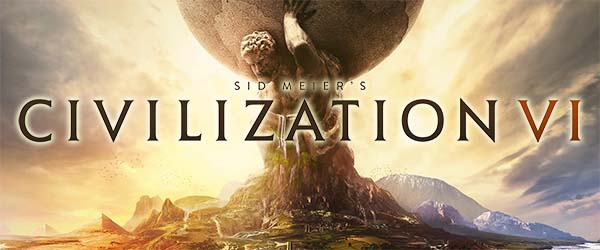
This will be the second part of a 2-part Retrospective on Civilization VI. The first part features my personal list of Top 10 Good Ideas that Firaxis put into the game, and this second part will be the Top 10 Bad Ideas. If you haven't read the Good Ideas yet, then I highly recommend you check that out first, as there will be several topics in this list that will build on what was said in the previous list. In fact, there will be some topics that are appearing in both lists, so I hope you'll read the good things that I have to say before reading the bad.
I also don't want to be a complete downer, and would like to provide constructive feedback. So wherever possible, I will try to make suggestions on how I think Firaxis could improve on some of these ideas if they chose to revisit them for future games. And some of these ideas are certainly worth re-visiting.
This content is also available in video essay format via YouTube.
[More]
07ea0b45-5d98-4ac1-9e2c-064bddd336aa|1|5.0
Tags:Civilization VI, Civilization VI: Rise and Fall, Civilization VI: Gathering Storm, Civilization VI: New Frontiers Pass, Sid Meier's Civilization, retrospective, top 10, privateer, pirate, world congress, agenda, leader, museum, trade route, wall, diplomacy, disaster, climate change
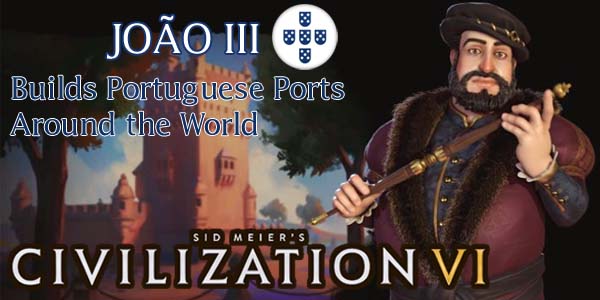
Firaxis has released the final "New Frontiers" update for Civilization VI. This update from March 2021 includes the new civilization Portugal, lead by João III.
If Firaxis decides to launch a second "New Frontiers" season, I will continue to write guides for the new civilizations and leaders. I will also put up polls on Patreon to let my Patrons decide which civ or leader to cover first (if Firaxis gives enough advance notice).

If "New Fontiers" is the end of the life cycle of Civilization VI, then don't fret. If I get enough interest from my Patrons, I'll also write guides for the "New Frontiers" game modes, or go back and create / update guides for legacy leaders. We also have new games such as Old World and Humankind coming out. I'll be playign both games when they release on Steam, and can also write guides for those games, if my supporters ask for it.
Portugal rose to prominence during the "Age of Discovery" in the 15th and 16th centuries, exploring the world and becoming the first global maritime empire. It established colonies and/or outposts in Brazil, Africa, India, and east Asia, it monopolized the spice trade, and was responsible for the formalization of the division of the globe into hemispheres. Portugal's dominion was short-lived however. A devastating earthquake in Lisbon in 1755, followed by occupation by Napoleonic France, and the eventual independence of Brazil combined to collapse the Portuguese maritime empire.

Portugal's maritime empire was laregely secured by King João III "The Pious" during his reign in the first half of the 16th century. João III established the first European colonies in Brazil and began importing Brazilwood into Europe, which was popular for creating red dyes. He was considered a scholar, humanist, and diplomat who supported the arts, granted scholarships to foreign universities, and remained neutral in wars between other European powers. But history is never so black-and-white, and João III is no exception. He also imported South American slaves into Europe from Brazil, and he boosted Portugal's relationship with the Vatican by allowing the Inquisition to establish itself in Portugal.
DISCLAIMER:
Civilization VI is still a "living game". Strategies for the game (and for specific leaders and civs) may change as Firaxis applies balance patches, introduces new features, or expands the game through further DLC or expansion packs, or as the Civ community discovers new strategies or exploits. As such, the following strategy guide may change from time to time. I will try to keep it up-to-date, and will make notations whenever changes are made. I'll also post links in the official 2K forums and CivFanatics, where I'll also report any changes made. If possible and practical, I will try to retain the original content of the strategy for posterity.
I welcome any feedback or suggestions that readers wish to offer. Feel free to post on the linked forums, or by posting a comment at the bottom of the page.
This guide is up to date as of the release of the [final] "New Frontiers" April 2021 Update (ver. 1.0.12.9)
João III explores the map to meet all other civilizations and city states, and will seek to establish peaceful trade relations with all of them, including constructing trade infrastructure in those other civilizations' cities. [More]
2a321222-ca59-47b4-8957-6177b584e9a1|0|.0
Tags:Sid Meier's Civilization, Civilization VI, Portugal, Portuguese, Joao III, casa da India, porta do cerco, navigation school, nau, caravel, feitoria, navigator's legacy, campus, navy, trade route, exploration, diplomacy, first contact
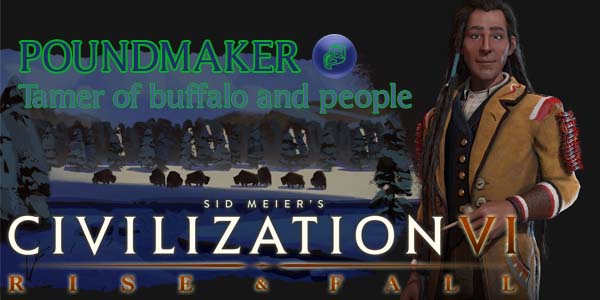
Civilization VI's first expansion, Rise & Fall released earlier this year, and it introduced a few leaders and civilizations that are making their first appearance in the franchise. I hope to be able to write strategies for every one of the expansion civs and leaders, but I'm going to start with the ones that are new to the franchise, and the ones that most utilize the expansion's new features (Era Score, governors, loyalty, and so on). This month, I will be tackling the Cree, lead by Poundmaker.
The Cree are a group of Algonquian-speaking North American First Nation hunter-gatherers. Their numbers have reached hundreds of thousands, and their territory has covered much of mainland Canada (stretching from Newfoundland all the way to western Alberta) and parts of modern-day northern Montana. They were divided into several subgroups based on region and dialect, but their social structure was mostly uniform. They grouped together into a "lodge" consisting of two families related by marriage. Several lodges would hunt and migrate together in a "band", with lodges routinely coming and going between different bands, or forming new bands.

As Cree bands migrated into the Great Plains, those bands began taking up buffalo hunting and herding. The leader of one such band, Pîhtokahanapiwiyin, became famous for his "divine" talent for using song and drum to attract buffalo into a walled pasture called a "pound". This talent, earned him the name Poundmaker from English-speakers. With the numbers of buffalo dwindling in the late 1800's, Pîhtokahanapiwiyin lead his people to Battleford to reaffirm his loyalty to the Queen and to negotiate for food and supplies. The townspeople, fearing an attack, holed up in the fort for several days, refusing to speak to Poundmaker, even though a spy had verified Poundmaker's peaceful intents. Canadian troops arrived a month later and attacked the Cree. The Canadians were routed, but Pîhtokahanapiwiyin ordered his warriors not to pursue, as he did not want a massacre. Despite not having instigated the conflict, Pîhtokahanapiwiyin surrendered to authorities in order to avoid further bloodshed. He was convicted of treason, and sent to prison. His sentence was only for seven months, but he died shortly after release due to a lung hemorrhage that he suffered in prison.
Pîhtokahanapiwiyin's actions, and his many alliances with other native tribes, and treaties with the Canadian government, have earned him a reputation as a skilled negotiator and a man of peace and wisdom. Today, the descendants of Pîhtokahanapiwiyin and his band live in the Poundmaker Cree Nation, a reservation in Saskatchewan, which was founded by Pîhtokahanapiwiyin himself.
DISCLAIMER:
Civilization VI is still very early in its life-cycle (particularly the Rise & Fall expansion. Strategies for the game (and for specific leaders and civs) may change as Firaxis applies balance patches, introduces new features, or expands the game through further DLC or expansion packs, or as the Civ community discovers new strategies or exploits. As such, the following strategy guide may change from time to time. I will try to keep it up-to-date, and will make notations whenever changes are made. I'll also post links in the official 2K forums and CivFanatics, where I'll also report any changes made. If possible and practical, I will try to retain the original content of the strategy for posterity.
I welcome any feedback or suggestions that readers wish to offer. Feel free to post on the linked forums, or by posting a comment at the bottom of the page.
This guide is up to date as of the July 2018 "Red Shell" patch (ver. 1.0.0.262)
Poundmaker had front-loaded bonuses that encourage him to be a trade-based peacemonger in Civilization VI: Rise & Fall, who gains additional bonuses from trade routes (either domestic or foreign) with cities that contain camps or pastures...
[More]
fc0ccceb-184d-4d57-905e-2ea1f5986234|1|5.0
Tags:Sid Meier's Civilization, Civilization VI, Civilization VI: Rise and Fall, Cree, Nehiyawak, Poundmaker, Pihtokahanapiwiyin, Nihithaw, favorable terms, iron confederacy, okihtcitaw, mekewap, alliance, trade route, trader, pottery, food, gold, production, camp, pasture, resource, housing, Canada, first nation, unique improvement, unique recon unit
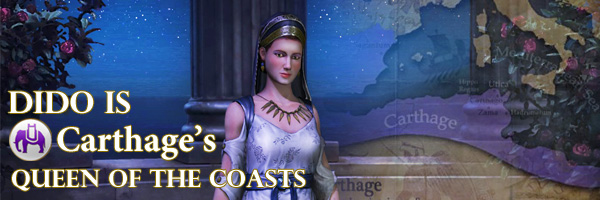
Continuing my series of strategy guides for the civilizations of Brave New World, I have now moved onto legacy civs whose strategies have changed somewhat due to the expansions' features. One civilization that received an indirect upgrade by the changes introduced in Brave New World is Dido's Carthaginian empire. Even though her actual ability didn't change, the new trade route mechanics changed the function of the harbor, which subtly changes how Carthage should be approached by Brave New World players.
In the ancient world, the Phoenicians exercised near absolute dominance over maritime trade in the south Mediterranean. Phoenician control was centered in Tyre, whose colonies paid tribute but were not directly controlled by Tyre itself. When Alexander the Great destroyed Tyre in 332 BC, the Phoenician colony of Carthage began claiming control over Tyre's former colonies in Sicily, Sardinia, Morocco, and Iberia, and established itself as the commercial center of the Western Mediterranean. This economic success and naval supremacy lead to three Sicilian Wars with Greece and three Punic Wars with the Roman Republic. The third Punic War resulted in the sacking and conquest of Carthage by the Romans.
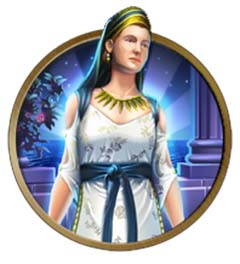
Historical records of Dido are very limited, and historians debate her historicity. The sources available indicate that she was the daughter of an unnamed King of Tyre, who named both her and her child brother, Pygmalion, as heirs. But when the king died, the people refused to acknowledge Dido as heir, and only Pygmalion was recognized. Pygmalion had Dido's husband, Acerbas murdered in order to claim Acerbas' vast wealth, and Dido stole away Acerbas' gold and fled Tyre along with some attendants and senators. She landed in North Africa, where a local Berber king granted her an amount of land that she could encompass with a single oxhide. So Dido cut the oxhide into small strips and encircled an entire nearby hill upon which the city of Byrsa was founded. She would later also found the city of Carthage before sacrificing herself in a pyre in order to remain faithful to her deceased husband and escape a marriage proposal from the Berber King. She would later be deified by the Carthaginian people, making it difficult to determine if the stories are genuine or just legend. [More]
74f48afc-17c0-43fc-a94b-e6ee198c32ae|6|4.0
Tags:Sid Meier's Civilization, Civilization V: Gods & Kings, Civilization V: Brave New World, Civilization V, Carthage, Dido, Phoenician Heritage, Quinquereme, African Forest Elephant, trireme, horseman, Feared Elephant, mountains, harbor, cargo ship, trade route, navy, Great General, Civ-V
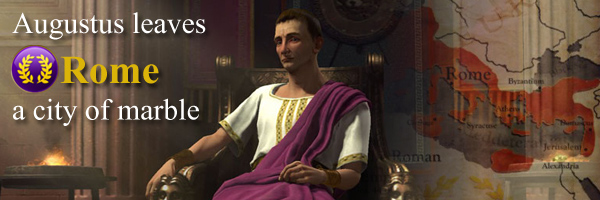
I've already covered strategies for the civilizations that have been added or explicitly changed in the Brave New World expansion and its major fall (2013) patch. Now I'm going to move on to other legacy civilizations that have not had explicit changes, but who may have had their strategies significantly altered by the expansions and other updates. This time, I will be covering one civ that surprisingly does not benefit from Brave New World's new mechanics as much as one might think: the Roman Empire.
Rome is one of the most influential and heavily romanticized cultures of the classical world. The early Roman republic was a system of semi-democratic representational government. Power was divided between two consuls who were annually elected by the citizens and alternated as military leaders to check each others' ambitions, while an appointed body of senators directed foreign policy and enacted laws. The city gradually expanded its power and influence in the second half of the first millennium BC through the overwhelming success of its legionary forces and defeat of its primary rival Carthage, until it eventually came to control almost the entire Mediterranean. Rome itself became the center of government and commerce for most of Europe, and it established an elaborate network of roads, aqueducts, and other engineering feats.
The Roman government was generally very tolerant of foreign religions and cultures, which helped to pacify subjugated peoples. But as Rome became an empire, and its holdings expanded, this tolerance became a liability. Foreign peoples were allowed admittance into the army in order to secure Rome's ever-increasing borders, which lead to a decline in loyalty to Rome as the army became more diverse and less centralized. Eventually, generals would begin competing with each other for control of Rome and the title of emperor, weakening the empire from within and making it vulnerable to external threats such as immigrating Germanic tribes displaced by the Huns. Eventually, these threats would culminate in the sacking of Rome by the Visigothic leader Alaric in August of 410 AD, and the collapse of the Western Roman Empire. However, the eastern half of the empire, also known as the Byzantine Empire, would continue to carry the torch of Rome for another thousand years.

After the death of Julius Caesar, his adopted nephew and heir, Gaius Octavius, along with Marc Antony and Marcus Lepidus, tracked down and defeated Brutus, Cassius, and the other assassins who had conspired against Caesar. This new triumvirate quickly disintigrated into civil war, with Octavius decisively defeating both Lepidus and then Antony and holding sole authority over a new Roman Empire. He changed his name to Caesar in honor of his adopted uncle, and reinstated the Roman senate as a puppet facade government to legitimize his dictatorial leadership. He was extremely popular among the Roman citizens due to his relation to Julius, and was eventually honored with the title Augustus. He instituted numerous domestic reform including official police and fire-fighting services, engineering projects such as roads, and expanded the dominion of Rome in Africa, Hispania, and Germania. Octavius found Rome a city of bricks; Augustus left it a city of marble, and the envy of the western world. [More]
d459e477-29a8-4c05-a582-9bfa0d6c216a|2|5.0
Tags:Sid Meier's Civilization, Civilization V: Brave New World, Civilization V, Rome, Augustus Caesar, Legion, Ballista, Glory of Rome, production, trade route, capital, swordsman, catapult, Civ-V
|

| 12 | | | | | | | 60 | | 11 | | | | | | | 55 | | 10 | | | | | | | 50 | | 09 | | | | | | | 45 | | 08 | | | | | | | 40 | | 07 | | | | | | | 35 | | 06 | | | | | | | 30 | | 05 | | | | | | | 25 | | 04 | | | | | | | 20 | | 03 | | | | | | | 15 | | 02 | | | | | | | 10 | | 01 | | | | | | | 05 |
|